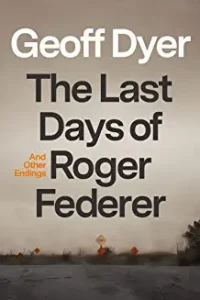The Last Days of Roger Federer and Other Endings by Geoff Dyer 2022
Dyer, a British essayist and cultural critic, has recently transplanted himself to California as a Visiting Writer at USC, and if this book is any indication, the change appears to have affected his mind.
I love Dyer’s work and have read almost everything he’s written about travel, art, photography, jazz, and literature. His ‘Otherwise Known as the Human Condition’, ‘Yoga for People Who Can’t be Bothered to Do It’, ‘White Sands’, and ‘Out of Sheer Rage’, were four of the most enjoyable collections of essays I’ve ever read—erudite, clever, laugh-out-loud funny, and overall, consistently interesting, while his novel ‘Jeff in Venice, Death in Varanasi’ was a tour-de-force. His book on photographers, “See/Saw: Looking at Photographs” was engrossing even though I had never heard of most of them. The guy is simply a brilliant observer of current life and a superb translator of those observations into prose.
Hence, my head-scratching at the current volume. It starts out brilliantly as he explores the theme of ‘endings’, moving from music (The Doors and Jim Morrison, a too early ending at 27) to art (primarily Turner, who he views as the precursor to abstract painting), literatures (Kerouac, Nietzsche, Lawrence, Bob Dylan, Shirley Hazzard, Martin Amis, and Larkin among others) and tennis ( Boris Becker, Bjorn Borg, and the eponymous Roger Federer)— a wonderful series of chapters that makes allusions and connections that made me smile and race to Google. Then, the book seemed to spin out of control as he turned away from my primary interest, literature, and focused increasingly on the arcana in the worlds of professional tennis and Coltrane’s jazz era. Perhaps it’s because I just don’t know those worlds, but my attention wandered while still admiring his ability to turn a phrase.
I thoroughly enjoyed the section about quitting a book, something that I’ve increasingly become capable of. Dyer proudly lists those books he has quit and will never return to including Robert Mansil’s A Man without Qualities, Proust, the Brothers Karamazov, Anthony Powell’s A Dance to the Music of Time (which he quit four volumes in!), Henry James’ The Ambassadors, and all of Faulkner. I feel better already!
The book about endings appears to have been stimulated by his 60th birthday (seems young to me!) and his increasingly injured body’s inability to play tennis. This is how he finally gets around to explaining what he’s trying to do in this book on page 245: “Adorno’s “Late Style in Beethoven” was an important early reference point for this book about last things, some of which are late, while some are precociously early. Not that this (He evidently is referring to this book!) was ever intended to be a comprehensive study of last things, or of lastness generally. It’s about a congeries of experiences things, and cultural artifacts that, for various reasons, have come to group themselves around me in a rough constellation during a phase of my life. Though not my last, hopefully, this phase is marked by a daily increasing consciousness that the next may well be—so much so that I feel I’d better get this done now in case it comes around sooner than I think, or that the last phase, whenever it comes, might be distinguished by an inability on my part to identify or articulate it.” Welcome to senior status, Geoff.
That ‘congeries’ and ‘rough constellation’ goes a long way to explain my occasional confusion about what he was trying to do here; nonetheless, there are many examples of Dyer’s wonderful gifts undimmed by his six decades. Here’s Dyer on poetry readings: “At any poetry reading, however enjoyable, the words we most look forward to hearing are always the same: “I’ll read two more poems”. The words we truly long for are “I’ll read one more poem” but two seems to be the conventionally agreed minimum.) It’s lovely hearing this. You can feel a sigh of relief passing through the audience, especially if the previous couple of poems have been precedent-setting sonnets clocking in at under a minute each. After long months in the sea of poetry the shout has gone up from the crow’s nest: ‘Land’. We’re almost there, we’ve made it, can practically taste the scurvy-healing lager being poured in a bar afterwards. But then, these two last poems turn out to be the opposite of the sonnets that had served as a double false dawn before the concluding multipart epics, the felt duration of each is twice as long as The Ring and the Book.” This brilliant piece goes on with more tongue in cheek humor but you get the idea!
Nietzsche is the author who Dyer dwells most upon, though Larkin and Martin Amis are close behind. A sad figure since his body and his oeuvre fell into the hands of his Nazi sister who twisted and turned his work into supporting Hitler and the other despicable supermen of the Third Reich. My favorite Nietzsche quote in the book is his recommendation that instead of praying every morning, one should “think on awakening whether one cannot this day give pleasure to at any rate one person.” That’s a perfect description of my daily postcard practice. Who knew I was a Nietzschean?
For all its faults and scattered structure, this is still a fine book to read whether you love essays, tennis, Nietzsche, Larkin or some combination—I hope that at 60 Dyer is just hitting his stride.



